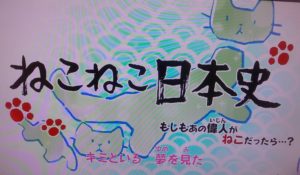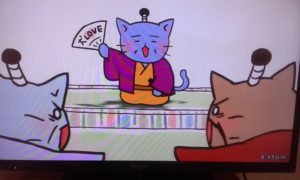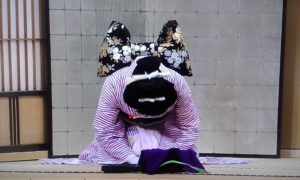Hi all and welcome to week 9 – well, actually it’s currently week 10 but this post is related to week 9.
I have to say that after all the highs and lows of the previous weeks, it was a pretty quiet week really. There were my usual outings, mainly directed at shopping, and which are completely driven by the weather. That is, at the beginning of the week, I look at what is coming weather-wise and decide which days I am going to go out and where to. As I don’t have a car, I do my shopping in parts. There are some places better for certain things than others, so it is also driven by what I need. Hence, I have to decide what I am going to eat for the week at the same time.
Generally, I am making meals which have 3 servings in them, although sometimes I overestimate and have to eat the same meal on 4 nights…but I am making 2 meals for each week. Also, every fortnight I have to walk over to Aeon Mall (is that from Aeon Flux??? or, was Aeon Flux named after a mall???), to get the cat supplies. Luckily they deliver and it is free – I suspect it is because I spend over 5,000¥ each time.
I also have to take my granny trolley with me on those outings during which I will be buying heavy things such as milk, drinking yoghurt and my veggies for the week. Then, of course, there is the nihonshu and that is a heavy item. I have tried to find a decent red here, but I haven’t lucked out yet. There is very little Australian wine here and I am not that up with French or Italian wines. I bought a Sangiovese a while back, it was over 3,000¥ (and that is expensive for here), but it was somewhat watery. Nothing like the lovely big wines in Australia…sigh. Yes, I do miss them. That cache of wine under the beds in the spare room…5 doz. Rockford…


This week Serena has really got into the bird watching. Outside the main window there are a couple of largish trees, quite nice really, and the birds do like to congregate there at times. In particular, there are 2 turtledoves who sleep in the trees overnight (and no, no partridge…), which she has taken a specific interest in. When she is really deep in observation of birds, she makes little noises, like little chirrups. When watching these two she is also using her ‘I want food’ noise and licking her lips!!! Shows how deeply embedded the desire to eat birds is in cats, considering we got her at 3 months and she has been an indoor cat, her only forays outside in a harness. She also paws at the window sometimes too. Here she is really getting hyped up (note the very rapidly moving tail) and below is one of the taunting turtledoves.


One thing that has taken my interest, which I saw on tv, is the public display of mummified monks in some temples, mainly in Yamagata. These monks are not bound or in any way covered, although they are dressed, as you can see below. This is one of the most famous mummies, the monk Daijuku Bosatsu Shinnyokai Shonin (1687-1783) at Dainichibo Temple. This is the one I saw on tv.

With my curiosity piqued, I did a little research on these monks and was somewhat surprised by the results. I don’t know if any of you will be interested as well, Craig said he was not at all interested…I must say, I am not inclined to travel to Yamagata to see them, but all the same, I found it interesting. See what you think…
It is said the practice of self-mummification, known as sokushinbutsu, was pioneered by a Japanese monk named Kukai over 1,000 years ago. This was a ritual undertaken by a Buddhist monk over a number of years that ended in the death and complete preservation of the body of the monk. This process of self-mummification was mainly practiced in Yamagata between the 11th and 19th centuries, by members of the Japanese school of Buddhism called Shingon (“True Word”). Those who undertook the ritual of sokushinbutsu did not view this as an act of suicide, but rather as a form of further enlightenment.
The steps involved in mummifying their own body were extremely rigorous and painful. For the first 1,000 days, the monks ceased all food except nuts, seeds, fruits and berries and they undertook extensive physical activity to strip themselves of all body fat. For the next 1,000 days, their diet was restricted to bark and roots. Near the end of this period, they would drink a poisonous tea made from the sap of the Urushi tree, which caused vomiting and a rapid loss of body fluids, which also caused the internal organs to shrink. It also acted as a preservative and killed off maggots and bacteria that would cause the body to decay after death.
In the final stage, after more than six years of preparation, the monk would lock himself in a stone tomb not much larger than his body, where he would go into a state of meditation. He was seated in the lotus position, and remained so until he died. A small air tube provided oxygen to the tomb. Each day, the monk rang a bell to let the outside world know he was still alive. When the bell stopped ringing, the tube was removed and the tomb sealed for the final thousand day period of the ritual.
Their body would be naturally preserved as a mummy with skin and teeth intact, without decay and without the need of any artificial preservatives.
The government did ultimately ban the practice in 1879. It is unknown how many monks actually ended their lives this way, but many have been found.
Anyway, I thought it was interesting…
Now, onto the photo of the week, which is related to my observation above of the dearth of Australian wines here. I do look to see if I can find any, and sometimes I find things which surprise even me!

Delightful!!!!!!!!
Never heard of it?!
And cheers to us all!



















 Stretching...
Stretching...























